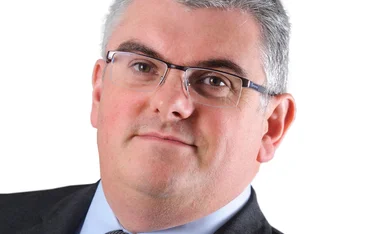
Reflecting on the third stage

Helphire boss Mark Adams speaks candidly to Mairi MacDonald about whether the credit hire system, in its present form, has come to the end of its useful working life and how he hopes to evolve his own business
Anyone who has taken a passing interest in the relationship between insurers and credit hire organisations will know there remain a host of issues that rankle with both sides. Even their participation in the general terms of agreement, first laid out by the Association of British Insurers eight years ago, has so far failed to resolve these.
As the largest and one of the oldest CHOs in the country, Helphire is an often cited but rarely quoted party in the debate. It is peculiarly viewed by various insurers as both an example of co-operative behaviour compared to the more maverick elements of the market, yet also an exponent of unpopular practices that have developed over time.
Yet speaking to newly appointed chief executive officer Mark Adams - who took over in November following the resignation of former CEO and founder Mark Jackson - it is the credit hire model itself that might have a limited shelf life, rather than the GTA as many insurers have suggested.
Bilateral agreement
The rising take-up of bilateral agreements is one of the most discussed alternatives - albeit in hushed tones - and while these would involve the same parties, the relationship would be on revised terms. There are other options too, and while Mr Adams emphasises there is still life in the traditional model, his comment that Helphire "is not married to the credit hire model" is quite telling.
Helphire's plan to diversify is driven by a number of internal and external factors. Its problems are two-fold: the industry has matured and, as a by-product of the automotive industry, it has been severely hit by the wider economic problems. This leaves Mr Adams with the task of finding new ways to employ Helphire's fleet of 18,000 vehicles to ensure they do not sit in a car park losing profit.
He joined the company last April as finance director having held similar roles within the service sector and, before that, within manufacturing and engineering.
His move into the service sector began in transport followed by retail and then travel where he worked at Alpha Airports Group, leaving in early 2008 following its takeover.
"I had no preconceived ideas about Helphire; credit hire wasn't an industry I was familiar with but I saw it as an exciting opportunity," he explains. "I saw that Helphire was a business with scale; a business that had ambitions to turn over in excess of £0.5bn. It was already turning over close to £400m at that stage and growing rapidly with a strong position in the market. Therefore, it was an attractive opportunity for me.
"Quite quickly we identified the need to look at the funding of the business and in July launched a fundraising through a placing and open offer."
He explains his predecessor as financial director, David Lindsay, became operations director and Mr Jackson also took the decision that it was time for him to retire.
Mr Adams is matter of fact about his swift rise to the top job, stating that Mr Jackson felt he had taken the company as far as he could having overseen the first two stages in its development. When the business was formed in 1992 it was one of the earliest CHOs and Helphire was, therefore, involved in the "creation of the industry".
Stage two of its evolution saw its referrer base move from the automotive industry to brokers and today about 40% of referrals come from the insurance industry.
"Building the original business model and taking it to the point where it became the leading player in the sector, Mark Jackson then felt it was time to hand the reins to someone new," says Mr Adams, adding that his CEO predecessor remains "a good friend of the company" as its largest private shareholder.
He now sees his role as driving Helphire into its third stage of development. "The market is maturing and it's time for more focus internally on the business, rather than externally. Mark has been instrumental in the growth of the business in recent years and recognised that his skill set probably wasn't appropriate for the next stage of the plan."
The old guard
As the last remaining founding member of Helphire, Mr Jackson's departure marked the end of the old guard. In January Richard Rose took over as chairman from Rodney Baker-Bates, and Charles Lambert has taken over as interim FD - and is a likely candidate for the permanent position, which will be announced in March.
With his new team, Mr Adams is now focused on implementing a different structure during 2009, which he announced to the market in a pre-close trading statement in December.
In a rather gloomy assessment of the future of the market, the company stated it had entered the financial year with "an infrastructure designed for higher levels than we are now anticipating" and announced its plans to cut costs and drive through efficiencies.
Although Mr Adams says the company's fleet is by far its biggest overhead - and now bigger than the credit hire work requires - he has not ruled out redundancies among its 3000 staff in the months to come. More details are expected in the next report on 22 February.
He comments: "We always knew the growth levels we were achieving were unsustainable - any business that grows at 40% recognises at some point that growth will come off. But it's fair to say it has come off much more quickly than we anticipated.
"We have just ended our half year and growth levels compared to the same period in the last financial year were significantly down, but that's more as a result of external factors."
Diversification is the logical next step, especially as the company aims to have 70% of its fleet in use at any one time. While Mr Adams says 90% of replacement vehicles are still used on a credit-hire basis, the drop-off in car usage has prompted him to be a little creative.
"We are committed to working with the insurance industry and developing the model. We recognise credit hire is the core product offering within our business, but we are more about providing mobility solutions to the motorist. So if the model evolves to the point where credit hire reduces and is replaced with other business, then so be it. To some extent, we are already providing these solutions."
Although he won't reveal numbers or names, Mr Adams says Helphire is working with a number of large insurers on a basis other than credit hire - for example, to provide vehicles on 'standard hires'. "We're working with insurance companies that sell replacement vehicle products to their customer base in conjunction with motor insurance. These are policies that provide replacement vehicles - irrespective of the reason that motorist's need has arisen. More and more insurers are offering these sorts of products. It's less than 10% of our business at the moment but it's an area we see as growing quite rapidly.
"We saw close to 100% growth in our standard hire volumes in the previous financial year and expect that level of growth to continue for the foreseeable future."
Part of Mr Adams' plan to develop the business also involves working on its relationship with insurers while at the same time respecting the interests of Helphire shareholders.
He says: "We are not totally wedded to the credit hire model and recognise that some insurers have issues with it. And while we believe it will remain an important part of our product offering for the foreseeable future, we are also interested in working with insurers to develop mobility solutions to meet their customers' needs."
Turning to the GTA, Mr Adams acknowledges it is failing - despite what he sees as the best efforts of Helphire and the credit hire industry to abide by its principles. He alludes to a recent announcement by the industry's two trade bodies - the Accident Management Association and National Association of Credit Hire Operators - that they have formed a working party to present a united front in their engagement with insurers, as evidence of the industry's preparedness to meet insurers half way (Post, 18 December 2008, p10).
Settling down
"There are challenges with the protocol and one of the biggest for CHOs is settlement of claims and the associated timescale," he comments. "As it stands within our business at the moment, it is taking on average in excess of 250 days for claims to be settled, which is unacceptable.
"The GTA works on the basis that claims should be settled within a 90-day period. Therefore, we need to understand why we are not achieving that level and to work with the insurance industry to improve the settlement process."
Inefficiencies within Helphire also need to be addressed, he concedes, such as ensuring its staff present payment requests in an appropriate form to the correct third-party insurer.
He adds: "And there are clearly some issues within insurers themselves, such as their ability to process claims in a timely manner. We're all conscious the level of credit-hire related claims has risen significantly over recent years and I'm of the view that certain insurers have not kept pace with that in terms of the resource that is required to review and settle claims."
However, he asserts that Helphire is "committed to taking cost out of this process" and says frictional or processing costs could be reduced through greater co-operation between the two sides.
The fact that increased litigation is mentioned in the same breath highlights another major issue and reason why co-operation will continue to be hard to secure.
"The performance we're achieving within collections is not acceptable, so we have increased both the size of our collections team and the litigation side of the business. We are increasing our emphasis on using litigation as a tool for ultimately achieving settlement of claims that can't be settled through the normal process."
He explains: "We give the insurer time to settle the claim, but if we can't reach an agreement with an insurer after a certain period - at present set at day 120 - we will pass that case into the hands of a solicitor to be litigated. This increases everyone's cost base and the only real beneficiaries are the lawyers; so that's why we are committed to trying to minimise the number of cases that go through to litigation."
In its next statement, Mr Adams is expected to outline how he intends to drive down the cost base to counter what is happening elsewhere in the business in terms of falling volumes or revenues.
As well as a lower number of accidents, the fact there are fewer cars on the roads has reduced hire times, hitting Helphire's income stream. Add to this the fact that the recession has meant residual values of cars are sliding, and you can see the company is losing money on the sale of its fleet. Helphire is now hanging on to vehicles for at least a year longer as a result of this rather than selling them on after 12 to 15 months, as was previously the case.
Driving down costs
"Our biggest cost is our fleet and we are looking for ways to increase its flexibility and reduce the cost of maintaining it. We entered the current financial year with expectations of business volumes being at a certain level and we have a fleet to service that level.
"With that level of business not coming through we have surplus vehicles but in the current climate we don't really want to sell them. Instead, we are looking for other ways to use these vehicles - for example, placing them on contract hire with daily rental companies that have a short-term requirement for them."
With market mutterings that the credit hire industry is unsustainable in the current tough market conditions, Mr Adams' commitment to turning around the Helphire model is to be commended and his success or otherwise will be watched with interest.
Only users who have a paid subscription or are part of a corporate subscription are able to print or copy content.
To access these options, along with all other subscription benefits, please contact info@postonline.co.uk or view our subscription options here: http://subscriptions.postonline.co.uk/subscribe
You are currently unable to print this content. Please contact info@postonline.co.uk to find out more.
You are currently unable to copy this content. Please contact info@postonline.co.uk to find out more.
Copyright Infopro Digital Limited. All rights reserved.
As outlined in our terms and conditions, https://www.infopro-digital.com/terms-and-conditions/subscriptions/ (point 2.4), printing is limited to a single copy.
If you would like to purchase additional rights please email info@postonline.co.uk
Copyright Infopro Digital Limited. All rights reserved.
You may share this content using our article tools. As outlined in our terms and conditions, https://www.infopro-digital.com/terms-and-conditions/subscriptions/ (clause 2.4), an Authorised User may only make one copy of the materials for their own personal use. You must also comply with the restrictions in clause 2.5.
If you would like to purchase additional rights please email info@postonline.co.uk







